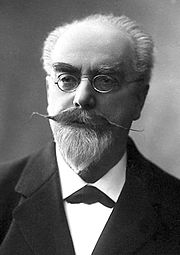Gabriel Lippmann
| Gabriel Lippmann | |
|---|---|
 |
|
| Born | Jonas Ferdinand Gabriel Lippmann 16 August 1845 Bonnevoie/Bouneweg, Luxembourg (since 1921 part of Luxembourg City) |
| Died | 13 July 1921 (aged 75) SS France, Atlantic Ocean |
| Nationality | France |
| Fields | Physics |
| Institutions | Sorbonne |
| Alma mater | École Normale Supérieure |
| Doctoral advisor | Gustav Kirchhoff |
| Other academic advisors | Hermann von Helmholtz |
| Known for |
Lippmann colour photography Integral 3-D photography Lippmann electrometer |
| Notable awards | Nobel Prize for Physics (1908) |
Jonas Ferdinand Gabriel Lippmann (16 August 1845 – 13 July 1921) was a Franco-Luxembourgish physicist and inventor, and Nobel laureate in physics for his method of reproducing colours photographically based on the phenomenon of interference.
Gabriel Lippmann was born in Bonnevoie, Luxembourg (Luxembourgish: Bouneweg), on 16 August 1845. At the time, Bonnevoie was part of the commune of Hollerich (Luxembourgish: Hollerech) which is often given as his place of birth. (Both places, Bonnevoie and Hollerich, are now districts of Luxembourg City.) His father, Isaïe, a French Jew born in Ennery near Metz, managed the family glove-making business at the former convent in Bonnevoie. In 1848, the family moved to Paris where Lippmann was initially tutored by his mother, Miriam Rose (Lévy), before attending the Lycée Napoléon (now Lycée Henri-IV). He was said to have been a rather inattentive but thoughtful pupil with a special interest in mathematics. In 1868, he was admitted to the École normale supérieure in Paris where he failed the agrégation examination which would have enabled him to enter the teaching profession, preferring instead to study physics. In 1872, the French government sent him on a mission to Heidelberg University where he was able to specialize in electricity with the encouragement of Gustav Kirchhoff, receiving a doctorate with "summa cum laude" distinction in 1874. Lippmann then returned to Paris in 1875, where he continued to study until 1878, when he became professor of physics at the Sorbonne.
Lippmann made several important contributions to various branches of physics over the years.
...
Wikipedia
